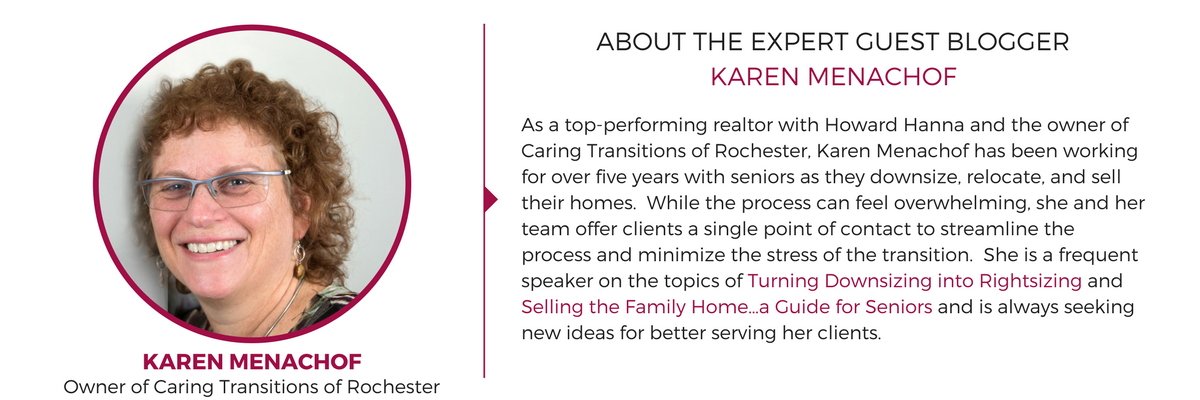
We are excited to present the first article in our Caring Transitions Owner Expert Series
written by, Caring Transitions of Rochester Owner and Realtor Karen Menachof, for Caring Transitions.

When choosing housing or buying and selling real estate, the needs of older adults and their families can be complex. Often complicated by issues such as family dynamics, deteriorating health, personal loss and financial constraints. Senior Real Estate expert Karen Menachof provides 5 best practice recommendations for real estate professionals selling property on a senior citizen's behalf.
Review the Process
It is not at all uncommon for
seniors to have been living in their home for 30 or more years. If that’s the
case, then the legal and logistics issues associated with selling their home
are probably unfamiliar and somewhat daunting. Be sure to review the process in
detail and provide plenty of time to address questions that are sure to arise.
Explain the Buyer’s Point of View
Much has changed since the
days when your client purchased their home. While “good bones” may have been a
great reason to choose a house in the 1950s, your clients may need to be
educated about what makes a home attractive in today’s market. Not only have
tastes changed, but todays buyers often prefer to buy a fully updated, move-in
ready home. Provide guidance about what buyers are willing to pay more for
and/or what will cause them to walk away so that your buyer can make informed
decisions about home improvements and pricing.
Review the Showing Process
Your clients should be
informed about what buyers expect when they come into the home. Be specific
about these expectations with clients (i.e., no dirty dishes anywhere in the
kitchen, no pet food visible, beds made) and find out how much advance notice
your clients will need to prepare for showings and then get out of the house to
ensure privacy for prospective buyers. If your client cannot manage this
easily, consider customizing the plan to accommodate the circumstances.
Confirm Your Clients Availability
Be sure you know how your
clients can best be reached so that they are easy to contact throughout the
process. Just because they have an email address or cell phone doesn’t
necessarily mean that they check them regularly, so explore what will work
best.
Similarly, you may want to
let prospective buyer’s agents know if you’ll need extra time to approve an
offer or get documents signed. I find that it often takes longer than with
other clients, as seniors are not comfortable signing documents electronically,
but prefer to meet face-to-face.
Explain the “Hidden Cost” of Homeownership
Seniors often don’t realize
that, when they sell their home, they are also responsible for leaving it empty
and broom clean. I often hear folks suggest that their buyers should be happy
to have their old tires, lawn mower, work benches, or Christmas decorations. As
their realtor, you’re the one who has to break it to them…they will have to
bear the expense associated with emptying the house of anything that wasn’t
specifically requested by the buyer. Don’t wait until the walk through to find
out that your client doesn’t understand this.

Infographics Source - https://www.zillow.com/blog/hidden-costs-of-homeownership-2017-219659/